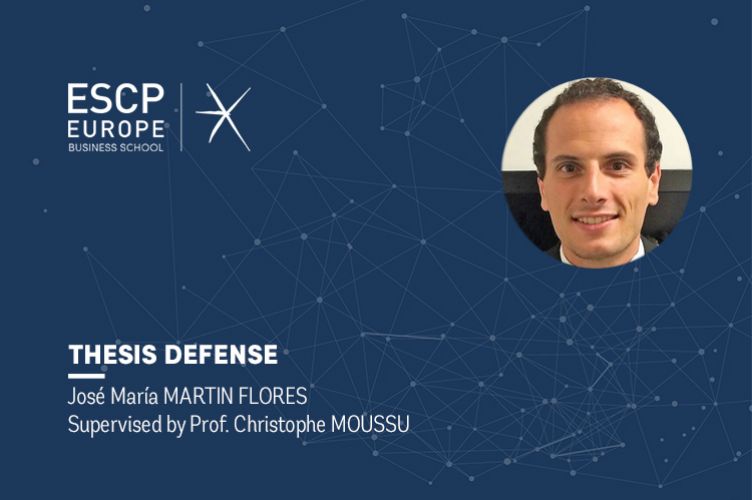6 June 2019 at 02:00 p.m
ESCP – Campus République – Room 4310
 José María MARTIN FLORES, PhD candidate in the Phd programme ESCP, will publicy defend his PhD thesis in Management Sciences.
José María MARTIN FLORES, PhD candidate in the Phd programme ESCP, will publicy defend his PhD thesis in Management Sciences.Non-Regulatory Incentives and Bank Behavior: The Stock-market, Taxes and Social Capital
Jury
Advisors
- Prof. Christophe MOUSSU,
ESCP
Referees
- Prof. Laëtitia LEPETIT,
Université de Limoges - Prof. Lars NORDEN,
Brazilian School of Public and Business Administration, Getulio Vargas Foundation
Suffragants
- Prof. Laurent WEILL,
EM Strasbourg Business School - Prof. Alberta DI GIULI,
ESCP - Prof. Michael TROEGE,
ESCP
Abstract
In the first chapter of this thesis, we study how stock-market forces determine the persistence of bank performance across crises. In this analysis, we observe that the persistence of business models that make banks more vulnerable across crises is not a specificity of publicly held banks but also applies to privately held institutions. However, for privately held banks, there is a group of banks that perform well across crises. This result suggests that stock-market listing may have adverse effects on the ability of banks to withstand crises well. To deepen the analysis of this problem, we look at banks that make a private-to-public transition between crises. Our results indicate that, after becoming publicly held, banks more subject to influences from short-term oriented institutional investors increase risk which makes top performer banks in one crisis more vulnerable to subsequent shocks.
In the second chapter of the dissertation, we shift the focus to bank capital as a factor that makes banks more resilient to economic shocks. Particularly, we focus on the extent to which the tax system may provide incentives that lead to better capitalized financial institutions. We exploit a tax change that reduces significantly the unequal tax treatment between equity and debt with respect to interests and cost of equity deductibility and show that, when provided with a tax incentive on new equity increases, banks increase their equity ratios. We also show that the increase in capital ratios does not survive the removal of the tax incentive. When the debt-equity tax bias is reestablished, banks reduce their equity ratios downwards. These findings document that tax incentives are an important determinant of bank capital ratios beyond regulatory aspects.
In the third article of the thesis, we focus on bank misconduct. In this chapter, we study how social capital can shape the behavior of bank managers. In particular, we document that social capital (defined as strength of civic norms and density of social networks in an area) is negatively related to the probability that a bank is involved in a misconduct case. Moreover, social capital exerts some discipline on wrongdoers. Once misconduct is revealed, banks tend to lose higher percentages of deposits market-share in areas characterized by higher social capital levels. In this dissertation, we thus highlight that the banks' environment is a central element of their risk appetite, stability and probability to commit misconduct. Elements as diverse as stock-market pressure, tax rules, and social capital play an important role in bank behavior.
Location
Organiser: ESCP
Paris - France
MapFecha
Start date: 06/06/2019
Start time: 2:00 PM
End time: 6:00 PM
